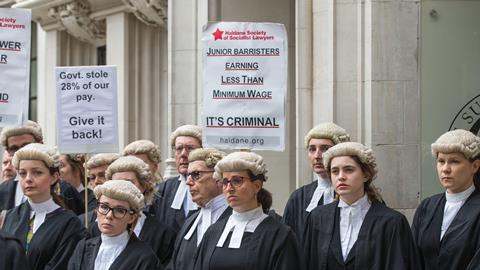Unsurprisingly – but to the disappointment of more than a few – criminal barristers voted to suspend their strike action and accept the government’s pay deal. Of 2,605 members of the Criminal Bar Association who took part in the ballot, 57% voted in favour.

The deal does not meet the 25% increase demanded by the CBA to make up for what it claims has been a 28% fee cut over the last decade. Some argue that the bar, as the main provider of Crown court advocacy, held a strong hand and should have pushed harder. Others suggest 15% was the best deal that could have been achieved when doctors and nurses are getting under 5%.
The deal nevertheless marks a significant increase from the original offer proposed when former justice secretary Dominic Raab refused to meet the CBA. It includes a 15% rise for most Crown court fees, including existing cases that make up the near-60,000 backlog. Previously the rise only applied to new work, with the government arguing that the law did not permit it to be backdated.
The deal also provides fees for section 28 pre-recorded cross-examinations and other case-preparation work, giving barristers more than the 15% that the Bellamy review stated was needed as the ‘minimum’. Yet sceptics note the effect of the rise has largely been wiped out by inflation.
Many cash-strapped juniors, earning an average of £12,200, do not think the deal does much for them. The chambers model has always relied on the exploitation of junior barristers. They are sent to far-flung magistrates’ courts to do poorly paid work and keep the solicitors who brief the senior members happy – with the promise of jam tomorrow.
There is no breakdown of how many under seven years’ call voted against the deal, but it is likely to have been most. And it remains to be seen how many of the 1,488 who voted ‘no’ will now vote with their feet and quit. It could be hundreds.
Many who voted ‘yes’ did so with reservations, particularly over the limited role of the proposed Criminal Legal Aid Advisory Board. Explicit references to pay, fees or remuneration have been removed from its terms of reference, and its recommendations will be advisory only.
There is also concern over the public commitment expected from bar leaders to ‘support measures to reduce the Crown court backlog’, and a fear that this could lead to longer hours and increased exploitation of the bar.
The government must be under no illusion that this truce is merely a suspension of hostilities. The bar has noticed, for the second time, that strike action works. If the government does not want a repeat, this must commence an era of increasing funding and addressing wider systemic issues.
Where does this leave solicitors, whose situation Lord Bellamy told MPs on the justice committee in January was ‘more parlous’ than barristers? They are only getting a 9% rise.
So far solicitors, who have largely supported the bar’s strike – bearing the brunt of grumpy judges and confused clients – have eschewed strike action. Some London firms announced they would not undertake burglary cases, as they were too badly paid. But as so few burglaries are prosecuted, this had little impact. Now they are all on the spot.
Unlike self-employed barristers, solicitors argue that striking would be put them at risk of action for breach of contract by the Legal Aid Agency or for cartel activity from the Competition and Markets Authority.
Neither of these threats is likely if they act together, in my opinion, but are solicitors sufficiently united?
Moreover, the bar has prosecuted its action skilfully, and bewigged barristers in front of the Old Bailey make for better newspaper images than disgruntled solicitors outside Oldham Magistrates’ Court.
The Law Society has asked the government to match the 15% rise being given to barristers. This is backed up by a threat that if the gap is not bridged by November, the Society ‘will advise our members that there is no viable future in criminal legal aid work’ and a warning that the exodus of solicitors will have a far greater impact than the bar strike.
Some interpret this as an enormous step for Chancery Lane, whose core values include supporting the rule of law and championing access to justice. But it is far from certain that the threat will succeed. The government has not yet been persuaded by abundant evidence of a collapsing system, and it has not been shamed to act by the threat of nurses going on strike, for example.
A spokesman explained that the Society is not calling on solicitors to strike. But remarks from outgoing president I. Stephanie Boyce – that ‘our members will see that disruptive action achieves results that hard evidence and constructive engagement do not’ – appear to lend tacit approval.
More will become clear, with a joint conference of the Criminal Law Solicitors’ Association and London Criminal Courts Solicitors’ Association. Will their members have any appetite for action? I suspect it will be limited.
They are certainly in the last-chance saloon. If they do not act now, the clear risk is that most criminal law firms close, leaving a few big firms to provide a ‘pile ’em high, sell ’em cheap’ service. That would doubtless lead to more convictions and miscarriages of justice. And more prison time, which the government is always content to fund.
Catherine Baksi is a freelance journalist and qualified barrister
This article is now closed for comment.
































5 Readers' comments